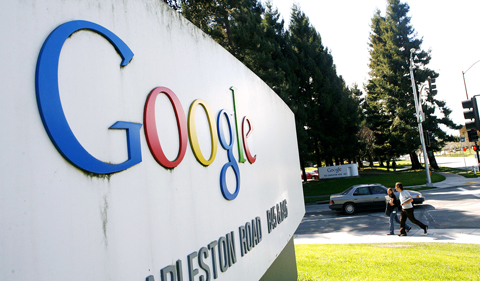Internet search leader Google Inc is teaming up with the New York Times and the Washington Post in an attempt to help out the ailing newspaper industry.
The new project, called “Living Stories,” debuted on Tuesday in the experimental “labs” section on Google’s Web site.
The service is supposed to make it easier for readers to follow evolving news stories. It will package stories from both the Times and the Post so the coverage can be more easily updated to include new developments.

PHOTO: AFP
Some of the initial topics featured on the service on Tuesday included healthcare reform, executive pay and the Washington Redskins football team.
Google isn’t paying the newspapers to feature the content, and there aren’t any immediate plans to sell advertising alongside the material, said Josh Cohen, a Google product manager overseeing the project.
Still, Google thinks Living Stories can help newspapers adapt to a shift that is causing millions of people to get their news from online sources instead of print. That’s a huge problem for newspapers because they make most of their money from ads appearing in print.
As print advertising has been crumbling, some newspaper publishers have lashed out against Google, which is based in Mountain View. They depict Google as a leech that has profited by showing snippets of their online stories and photographs.
Rupert Murdoch, chief executive of News Corp, has been among the most outspoken critics.
He has even threatened to block Google from listing News Corp’s publications, including the Wall Street Journal, in its search index.
The New York Times, though, regards Google as an ally, according to Martin Nisenholtz, who oversees the newspaper’s online operations.
“We have a very successful, significant relationship with Google,” Nisenholtz told investors and analysts on Tuesday at a media conference in New York.
Separately, Google on Tuesday released a version of its Chrome Web browser for Macintosh computers in a challenge to Safari software Apple offers users of its machines.
“We took a hefty dose of goodness from the Windows version to build a fast, polished browser for Mac,” software engineers John Grabowski and Mike Pinkerton of the Google Chrome team said in a blog post.
Late last year Google released a Chrome browser for personal computers running on Windows software made by technology rival Microsoft, which promotes its own Internet Explorer browsers.
The Macintosh version of Chrome is in “beta,” or test, mode and does not yet have customization features such as allowing extension programs or bookmark management, the engineers said.
Google on Tuesday also released a beta version of Chrome for computers running on open-source Linux operating systems.
Linux and Windows compatible versions of Chrome could be customized with features such as mini “extension” programs.
“We hope the betas for Mac, Linux and extensions were some of the things on your wish list this year,” Google product manager Brian Rakowski said in a blog post.

Authorities have detained three former Taiwan Semiconductor Manufacturing Co (TMSC, 台積電) employees on suspicion of compromising classified technology used in making 2-nanometer chips, the Taiwan High Prosecutors’ Office said yesterday. Prosecutors are holding a former TSMC engineer surnamed Chen (陳) and two recently sacked TSMC engineers, including one person surnamed Wu (吳) in detention with restricted communication, following an investigation launched on July 25, a statement said. The announcement came a day after Nikkei Asia reported on the technology theft in an exclusive story, saying TSMC had fired two workers for contravening data rules on advanced chipmaking technology. Two-nanometer wafers are the most

DEFENSE: The first set of three NASAMS that were previously purchased is expected to be delivered by the end of this year and deployed near the capital, sources said Taiwan plans to procure 28 more sets of M-142 High Mobility Artillery Rocket Systems (HIMARS), as well as nine additional sets of National Advanced Surface-to-Air Missile Systems (NASAMS), military sources said yesterday. Taiwan had previously purchased 29 HIMARS launchers from the US and received the first 11 last year. Once the planned purchases are completed and delivered, Taiwan would have 57 sets of HIMARS. The army has also increased the number of MGM-140 Army Tactical Missile Systems (ATACMS) purchased from 64 to 84, the sources added. Each HIMARS launch pod can carry six Guided Multiple Launch Rocket Systems, capable of

CHINA’s BULLYING: The former British prime minister said that he believes ‘Taiwan can and will’ protect its freedom and democracy, as its people are lovers of liberty Former British prime minister Boris Johnson yesterday said Western nations should have the courage to stand with and deepen their economic partnerships with Taiwan in the face of China’s intensified pressure. He made the remarks at the ninth Ketagalan Forum: 2025 Indo-Pacific Security Dialogue hosted by the Ministry of Foreign Affairs and the Prospect Foundation in Taipei. Johnson, who is visiting Taiwan for the first time, said he had seen Taiwan’s coastline on a screen on his indoor bicycle, but wanted to learn more about the nation, including its artificial intelligence (AI) development, the key technology of the 21st century. Calling himself an

South Korea yesterday said that it was removing loudspeakers used to blare K-pop and news reports to North Korea, as the new administration in Seoul tries to ease tensions with its bellicose neighbor. The nations, still technically at war, had already halted propaganda broadcasts along the demilitarized zone, Seoul’s military said in June after the election of South Korean President Lee Jae-myung. It said in June that Pyongyang stopped transmitting bizarre, unsettling noises along the border that had become a major nuisance for South Korean residents, a day after South Korea’s loudspeakers fell silent. “Starting today, the military has begun removing the loudspeakers,”